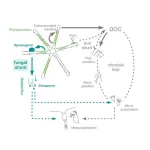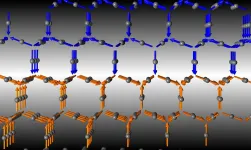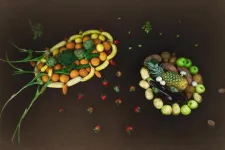"Mexican variant" and monitoring actions of SARS-CoV-2 genome
2021-06-04
(Press-News.org) A research group of the Department of Pharmacy and Biotechnology of the University of Bologna analyzed more than one million SARS-CoV-2 genome sequences. This analysis led to the identification of a new variant that, over the past weeks, has been spreading mostly in Mexico but has also been found in Europe. Their paper published in the Journal of Medical Virology presented the so-called "Mexican variant", whose scientific name is T478K. Like other strains, this presents a mutation in the Spike protein, which allows coronaviruses to attach to and penetrate their targeted cells.
"This variant has been increasingly spreading among people in North America, particularly in Mexico. To date, this variant covers more than 50% of the existing viruses in this area. The rate and speed of the spread recall those of the 'British variant'", explains Federico Giorgi, who is the study coordinator and a professor at the Department of Pharmacy and Biotechnology of the University of Bologna. "The mutation of the Spike protein is structurally located in the region of interaction with human receptor ACE2. Coronaviruses attach to this receptor to infect cells, thus spreading the infection with more efficacy".
The researchers started from the analysis of almost 1.2 million sequenced samples of the SARS-CoV-2 genome found in international databases until April 27, 2021. The new T478K variant was detected in 11435 samples. This is double the number of samples that presented the same variant just a month earlier. Such an increase since the beginning of 2021 alarmed the researchers.
The "Mexican variant" spreads evenly across males and females and age ranges. This variant represents 52.8% of all sequenced coronaviruses in Mexico, whereas in the United States it shows up only in 2.7% of the sequenced samples. As concerns Europe, the "Mexican variant" has spread feebly in Germany, Sweden, and Switzerland. In Italy is virtually non-existent with only 4 reported cases.
The mutation characterizing this variant is located in a region of the Spike protein that is responsible for the interaction with the human receptor ACE2: this is the mechanism allowing coronaviruses to access the cells. Similar mutations are common to all variants that have been at the center of attention in the past months. Indeed, recent coronavirus variants stand out for their high infection rates, which made them pervasive in many areas of the world.
Researchers tested the action of T478K Spike protein with in silico simulations and found out that this mutated protein can alter the superficial electrostatic charge. Consequently, it can change not only the interaction with the ACE2 human protein but also with the antibodies of the immune system and thus hinder drug efficacy.
"Thanks to the great amount of data available in international databases, we can hold an almost real-time control over the situation by monitoring the spread of coronavirus variants across different geographical areas", concludes Giorgi. "Keeping up this effort in the next months will be crucial to act promptly and with efficient means".
INFORMATION:
"Preliminary report on SARS-CoV-2 Spike mutation T478K" is the title of the study published in the Journal of Medical Virology. The authors are Simone di Giacomo, Daniele Mercatelli, Amir Rakhimov, and Federico Giorgi, all from the Department of Pharmacy and Biotechnology of the University of Bologna.
ELSE PRESS RELEASES FROM THIS DATE:
2021-06-04
Tiny algae in Earth's oceans and lakes take in sunlight and carbon dioxide and turn them into sugars that sustain the rest of the aquatic food web, gobbling up about as much carbon as all the world's trees and plants combined.
New research shows a crucial piece has been missing from the conventional explanation for what happens between this first "fixing" of CO2 into phytoplankton and its eventual release to the atmosphere or descent to depths where it no longer contributes to global warming. The missing piece? Fungus.
"Basically, carbon moves up the food chain in aquatic environments differently than we commonly think it does," said Anne Dekas, an assistant professor of Earth system science at Stanford University. Dekas is the senior ...
2021-06-04
Though it might seem inanimate, the soil under our feet is very much alive. It's filled with countless microorganisms actively breaking down organic matter, like fallen leaves and plants, and performing a host of other functions that maintain the natural balance of carbon and nutrients stored in the ground beneath us.
"Soil is mostly microorganisms, both alive and dead," says END ...
2021-06-04
Like all metals, silver, copper, and gold are conductors. Electrons flow across them, carrying heat and electricity. While gold is a good conductor under any conditions, some materials have the property of behaving like metal conductors only if temperatures are high enough; at low temperatures, they act like insulators and do not do a good job of carrying electricity. In other words, these unusual materials go from acting like a chunk of gold to acting like a piece of wood as temperatures are lowered. Physicists have developed theories to explain this so-called metal-insulator transition, but the mechanisms behind the transitions are not ...
2021-06-04
There's a lot of interest right now in how different microbiomes--like the one made up of all the bacteria in our guts--could be harnessed to boost human health and cure disease. But Daniel Segrè has set his sights on a much more ambitious vision for how the microbiome could be manipulated for good: "To help sustain our planet, not just our own health."
Segrè, director of the END ...
2021-06-04
A new drug reduced tumor size in patients who have lung cancer patients with a specific, disease-causing change in the gene KRAS, a study found.
The results of the CODEBREAK 100 phase 2 clinical trial were presented June 4, 2021, at the American Society of Clinical Oncology (ASCO) annual meeting and published simultaneously in the New England Journal of Medicine. The efficacy and safety of the drug sotorasib, developed by Amgen Inc., was tested in patients with non-small-cell lung cancer (NSCLC) harboring a specific change, or mutation, in the DNA code for KRAS.
The KRAS mutant protein targeted in the study was p.G12C, in which a glycine building ...
2021-06-04
Washington, DC--A team led by Carnegie's Thomas Shiell and Timothy Strobel developed a new method for synthesizing a novel crystalline form of silicon with a hexagonal structure that could potentially be used to create next-generation electronic and energy devices with enhanced properties that exceed those of the "normal" cubic form of silicon used today.
Their work is published in Physical Review Letters.
Silicon plays an outsized role in human life. It is the second most abundant element in the Earth's crust. When mixed with other elements, it is essential for many construction and infrastructure projects. And in pure elemental form, it ...
2021-06-04
A study of more than 1,000 demographically representative participants found that about 22 percent of Americans self-identify as anti-vaxxers, and tend to embrace the label as a form of social identity.
According to the study by researchers including Texas A&M University School of Public Health assistant professor Timothy Callaghan, 8 percent of this group "always" self-identify this way, with 14 percent "sometimes" identifying as part of the anti-vaccine movement. The results were published in the journal Politics, Groups, and Identities.
"We found these results both surprising and concerning," Callaghan said. "The fact that 22 percent of Americans at least sometimes identify as anti-vaxxers was much higher than expected and demonstrates ...
2021-06-04
Most Americans should get screened for colorectal cancer beginning at age 45 instead of age 50, according to new recommendations from the U.S. Preventive Services Task Force, which includes UVA Health's Li Li, MD, PhD, MPH. This recommendation applies to Americans without symptoms who do not have a history of colorectal polyps or a personal or family health history of genetic disorders that increase the risk of colorectal cancer.
Colorectal cancer is the third-leading cause of cancer death in America, according to the Task Force, and an increasing number of cases are being diagnosed in younger Americans. The Task Force notes that colorectal cancer diagnoses among Americans ages 40 to 49 increased by almost 15% from 2000-02 to 2014-16. Black ...
2021-06-04
While previous research early in the pandemic suggested that vitamin D cuts the risk of contracting COVID-19, a new study from McGill University finds there is no genetic evidence that the vitamin works as a protective measure against the coronavirus.
"Vitamin D supplementation as a public health measure to improve outcomes is not supported by this study. Most importantly, our results suggest that investment in other therapeutic or preventative avenues should be prioritized for COVID-19 randomized clinical trials," say the authors.
To assess the relationship between vitamin D levels and COVID-19 ...
2021-06-04
Tuberculosis (TB) is a deadly infection that occurs in every part of the world. The standard treatment for TB, a six-month multidrug regimen, has not changed in more than 40 years. Patients can find it difficult to complete the lengthy regimen, making it more likely that treatment resistance will develop.
A research team led by a Medical University of South Carolina (MUSC) investigator reports in the May 6 issue of the New England Journal of Medicine that a four-month treatment regimen using rifapentine is effective for treating TB. Shortening the treatment duration is an important step toward increased patient adherence.
In 2019 alone, 1.4 ...
LAST 30 PRESS RELEASES:
[Press-News.org] "Mexican variant" and monitoring actions of SARS-CoV-2 genome




